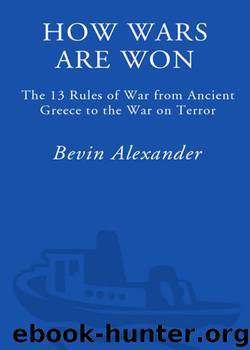How Wars Are Won by Bevin Alexander

Author:Bevin Alexander
Language: eng
Format: epub
Tags: Nonfiction
ISBN: 9780307421036
Publisher: The Crown Publishing Group
Published: 2007-12-18T05:00:00+00:00
The Drive to the Yalu in Korea, 1950
In October 1950, the United States decided to drive a stake in the heart of the Communist North Korean state by occupying the country and reuniting Korea under the right-wing government of South Korea. This decision was made by President Harry Truman after American forces landed at Inchon. It was seconded by Secretary of State Dean Acheson and by the Far East commander, Douglas MacArthur.
The North Koreans had penetrated deep into South Korea, but were stopped by American and South Korean forces at the “Pusan perimeter” around the southern port city of Pusan. The invasion of Inchon, far to the north of the perimeter, and the swift capture of Seoul, twenty miles away, severed the rail line supplying the North Koreans, and forced them into precipitate retreat back beyond the thirty-eighth parallel, the boundary between the two Koreas.
Communist China deeply opposed a forced reunion of the country, and warned the United States it would intervene if American forces entered North Korea. Yet President Truman believed the assurances of General MacArthur that the Chinese were only bluffing, and authorized the sweep of several columns toward the Yalu River. The Chinese did intervene, caused enormous American losses, and forced the Americans to retreat back into South Korea, abandoning their effort to destroy North Korea.
The American effort failed because the American leadership refused to face reality.
Upon the surrender of Japan in August 1945, Korea had been divided between American and Soviet occupiers. The Americans created a right-wing state in the south, the Soviet Union a Communist state in the north. North Korea had invaded the south on June 25, 1950, with the aim of forcibly reuniting the peninsula by destroying the South Korean government. Now the United States intended to do the same thing in reverse, destroying the North Korean state and reuniting it by force with the south.
But the goal flew in the face of Communist China’s suspicion that the United States had a much deeper motivation—to place its army on the Yalu River in order to help its informal ally, Chiang Kai-shek, leader of the Chinese Nationalists, whom the Communists had only driven from the mainland to Taiwan the year before.
Believing that the Korean War represented the first stage of a Soviet effort to conquer the world, and that Communist China was only a satellite of the Soviet Union, the United States turned to anti-Communist Chiang shortly after the Korean War started. Communist China was not a tool of the Soviet Union, however, and its leaders feared the Americans would sponsor a Nationalist offensive across the Yalu in an attempt to reconquer China. That is why Beijing warned the United States that it would intervene if American forces crossed into North Korea.8
President Truman and Secretary of State Acheson discounted the danger, believing MacArthur, who said the Chinese threats were “diplomatic blackmail.” Truman authorized MacArthur to advance into North Korea. The attack got under way on October 9, 1950.9 When MacArthur met with President Truman
Download
This site does not store any files on its server. We only index and link to content provided by other sites. Please contact the content providers to delete copyright contents if any and email us, we'll remove relevant links or contents immediately.
| Africa | Americas |
| Arctic & Antarctica | Asia |
| Australia & Oceania | Europe |
| Middle East | Russia |
| United States | World |
| Ancient Civilizations | Military |
| Historical Study & Educational Resources |
The Radium Girls by Kate Moore(12000)
100 Deadly Skills by Clint Emerson(4898)
Rise and Kill First by Ronen Bergman(4757)
The Templars by Dan Jones(4671)
The Doomsday Machine by Daniel Ellsberg(4472)
The Rape of Nanking by Iris Chang(4188)
Killing England by Bill O'Reilly(3985)
Stalin by Stephen Kotkin(3936)
Hitler in Los Angeles by Steven J. Ross(3935)
12 Strong by Doug Stanton(3537)
Hitler's Monsters by Eric Kurlander(3313)
Blood and Sand by Alex Von Tunzelmann(3179)
The Code Book by Simon Singh(3160)
Darkest Hour by Anthony McCarten(3111)
The Art of War Visualized by Jessica Hagy(2985)
Hitler's Flying Saucers: A Guide to German Flying Discs of the Second World War by Stevens Henry(2736)
Babylon's Ark by Lawrence Anthony(2658)
The Second World Wars by Victor Davis Hanson(2510)
Tobruk by Peter Fitzsimons(2492)
